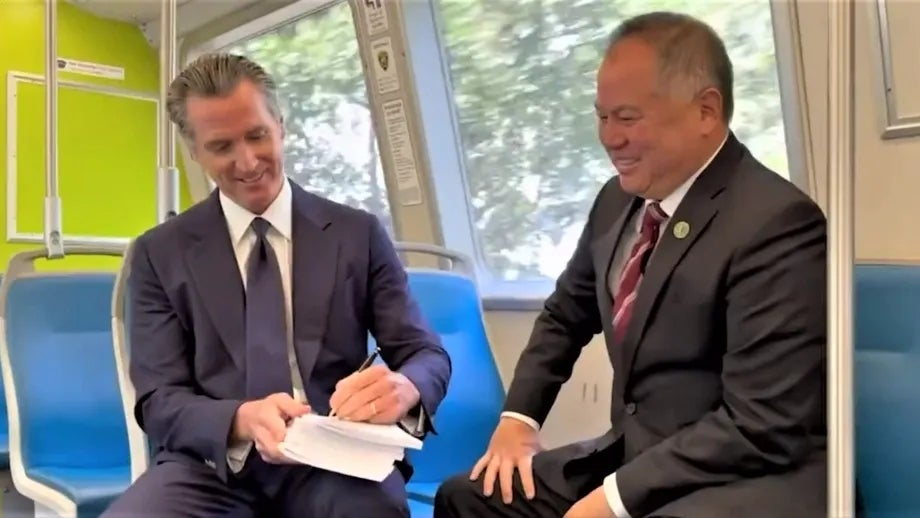Budget Buys Time for Transit to Build New Business Model
Gov. Gavin Newsom signs the state budget on a BART train Wednesday morning with Assembly Budget Chairman Phil Ting.
California transit agencies this week received expected but nonetheless welcome financial news as the fiscal 2023-24 state budget signed into law by Gov. Newsom while aboard a BART train includes $1.1 billion in flexible transportation funding to help support their operations. The state investment, which largely follows the contours of a budget agreement released by the Legislature earlier this month, will help transit agencies avoid a near-term ‘fiscal cliff’ that likely would have led to deep service cuts as early as this year by Muni, BART and other agencies whose fare revenues remain well below pre-pandemic levels. The new budget also restores a previously imperiled $4 billion commitment for local transit capital improvements, with an option to flex these funds toward transit operations. The Bay Area's share of this $4 billion total is estimated to be about $800 million.
Noting the $5.1 billion for public transit included in the new budget, Gov. Newsom said in an Instagram video released this morning, “That’s a significant improvement from where we expected the budget to land…But in return we’re also demanding more accountability. We’re demanding more collaboration. We’re demanding a new approach, a new business model for public transit. Not just for Bay Area Rapid Transit but for public transit writ large.”
“MTC truly appreciates the hard work done by so many to craft a budget that recognizes the importance of public transit to maintaining California’s economic growth and to meeting our mobility, climate and equity goals,” said Commission Chair and Napa County Supervisor Alfredo Pedroza. “Members of the Bay Area legislative caucus, including Senate Budget Committee Chair Nancy Skinner, Assembly Budget Committee Chair Phil Ting and Sen. Scott Wiener, have been incredibly engaged in this year’s budget work; and their attention has been matched by Assembly Speaker Anthony Rendon, Senate President Pro Tem Toni Atkins and others from around the state. Gov. Newsom’s call for public transit to develop a new business model for a new era is smart and well stated. Our Commission is eager to work with the governor and with the Legislature to step up the pace on the transit transformation work that’s already started here in the Bay Area.”
The new budget will allow California transit agencies to use up to a combined $1.1 billion from select sources, including the state’s Cap-and-Trade program for greenhouse gas emission allowances, over the next three years to support operating costs (fuel, drivers, mechanics, etc.) as well as to cover capital expenses associated with the transition to zero-emission transit as required by the Air Resources Board's Innovative Clean Transit rule. MTC is expected to receive the Bay Area's share of these funds and then to determine the ultimate distributions to Bay Area transit agencies.
The restoration of the full $4 billion in capital funds for fiscal 2023-24 and 2024-25 will help keep on track major Bay Area projects such as BART’s Transbay Core Capacity initiative to boost service frequencies through the Transbay Tube linking San Francisco and Oakland, and the BART extension to be built by the Santa Clara Valley Transportation Authority from Berryessa/North San Jose through downtown San Jose to a new terminus in Santa Clara. The Major Projects Advancement Policy (MAP) adopted by MTC last year identifies these projects as the primary recipients of future transit capital dollars that will flow to MTC for distribution.


Submit your comment
In order to receive a reply to your comment, please provide an email address.